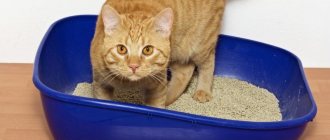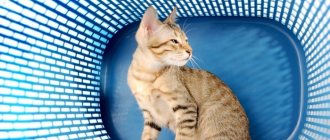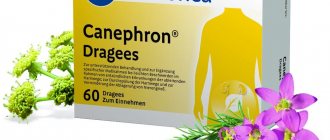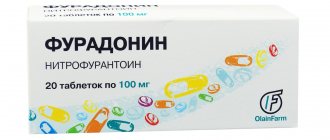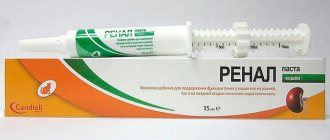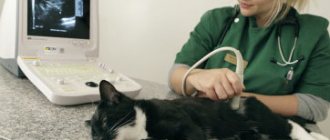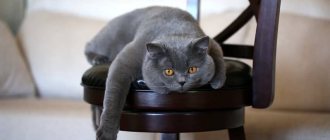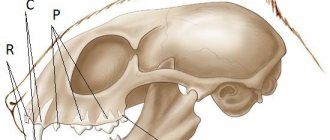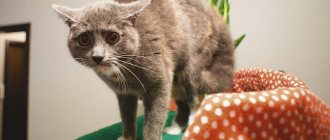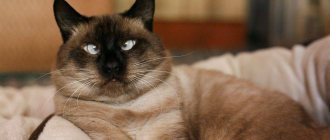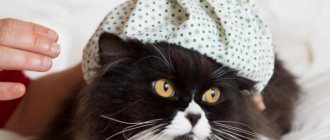Statistics say that diseases of the urinary system in pets are in first place in terms of prevalence, and the greatest danger to their health and life is urolithiasis (UCD). Yes, our little friends can also suffer from the consequences of deposits of salts, oxides, etc. uroconcretions (which ordinary people call stones or sand) - everything that can disrupt the capacity of the urinary duct. And our duty is not just to help our pets avoid dangerous chronic pathologies caused by stagnant problems with urethral blockage, but to diagnose the disease in a timely manner, provide proper treatment and not forget about the prevention of urolithiasis, which is so necessary for every pet.
Types of nutrition for cats and cats with urolithiasis
The diet is prescribed by a veterinarian after conducting the necessary examination and prescribing appropriate therapy. It is not enough for the owner to purchase specialized cat food, because the choice of food should be based on taking into account the characteristics of the course of the disease. In some cases, dry food may be difficult to digest, and natural products require adherence to dosage and individual menu design.
Proper nutrition speeds up recovery
Natural food
The composition of medicinal food for cats with urolithiasis should include vitamins, probiotics, carbohydrates, and proteins. Dietary nutrition requires maintaining a balance between all the necessary components. The menu is compiled individually, taking into account the nature of the pathology, age and weight of the pet.
Everything is prepared only from fresh ingredients, without adding flavorings or salt. Before giving food to the animal, it is cooled to room temperature. The remaining food is thrown away; a fresh dish must be prepared for the next feeding. The diet for the duration of treatment excludes the possibility of pampering the animal with sausage or canned food.
Important! Proper nutrition based on natural food involves controlling the amount of food consumed.
Specialized
Dry food arouses greater interest in the furry patient, which allows the animal owner not to worry about the pet’s satiety.
Dry food makes cats more interested
The advantages of specialized cat food for urolithiasis are:
- economical consumption;
- balanced composition;
- ease of determining the daily dosage.
The transition to this diet occurs within 4 days; every day, a quarter of the normal amount of other food is replaced with medicinal food. With such a diet, you only need to ensure that there is clean water in the animal’s bowl and do not exceed the dose recommended by the manufacturer and veterinarian.
Causes of urolithiasis in cats. How to avoid it?
In recent years, urolithiasis or urolithiasis has increasingly affected domestic animals. This is a disease of the urinary system, which is characterized by the formation of calculi - stones and sand in the bladder. It is always accompanied by pain, damage to the mucous membrane of the bladder and urethra, which is why cystitis develops.
The causes of the disease are very diverse and can be divided into several groups:
- Species. Urolithiasis is quite rare in dogs; the disease is usually found in cats. Due to evolutionary development, cats have more concentrated urine than dogs. This is due to their history, their way of life, and many other factors. Concentrated urine produces sand and stones more easily.
- Anatomical. Urolithiasis affects cats more often than cats. The fact is that cats have a very narrow and tortuous urethra. Sand from the bladder cannot be fully washed out in the early stages of the disease, accumulates there and causes the formation of larger stones, which can clog the urethra and lead to serious complications. In cats, the urethra is shorter and wider.
- Feeding. There is a very common belief that feeding dry food causes bladder stones. Fortunately, this is not entirely true. The appearance of calculi is promoted not by feeding dry food, but by limiting watering. That is, if your pet eats dry food, you must always provide him with fresh, clean drinking water in unlimited quantities. And many dry cat foods contain special ingredients that prevent the occurrence of urolithiasis. A small amount of meat products in the diet, feeding from the table or low-quality foods can lead to alkaline urine and the formation of stones. Conversely, feeding an animal only meat increases the concentration of urea in the urine, which can also lead to urolithiasis.
- Watering. Water for drinking your pet must be of high quality. The high content of minerals in water - phosphates, calcium and magnesium salts, can become another factor in the development of urolithiasis.
- Other diseases. The urinary system is very well protected by the immune system and specific anatomy from many problems. It is not so easy to upset this delicate balance. But hypothermia, stress, and poor hygiene of the external genitalia can lead to various diseases of the urinary system. In this case, it is imperative to treat your pet promptly and efficiently. An untreated disease can progress to a chronic stage, and as a result become a favorable factor for the development of urolithiasis.
- Lack of iodine. A lack of iodine in the body can lead to many diseases, including urolithiasis. This is especially important for the Chelyabinsk region, since the soil and water here are poor in iodine. It is recommended to give iodine preparations to pets in courses and take them on their own.
- Patience. Many cats will not go into a dirty litter box, and most dogs refuse to litter the house. Both of them often have to endure the whole day until the owner arrives. The longer and more often your pet has to endure it, the more likely it is to develop urolithiasis and many other diseases of the urinary system.
- Obesity. Nowadays you can often find fat dogs, and plump cats have filled the entire Internet. Obesity leads to many serious health problems. Among others, it can indirectly cause urolithiasis. With obesity, the pet's weight increases significantly and the need for water increases. But often a dog or cat simply cannot drink as much water as they need. A small amount of water leads to an increase in urine concentration, which in turn serves as a factor for the development of urolithiasis.
- Decreased immunity, stress, metabolic disorders, hypovitaminosis and much more can become a predisposing factor in the development of urolithiasis.
An impressive list, isn't it? Almost every pet falls into the risk zone - some have a dog who has to wait for the owner from work for more than 8 hours, another has a cat that doesn’t like to drink water, and a third has a cat, and this is enough to start preventing urolithiasis.
How to prevent urolithiasis?
Unfortunately, there is no one way that will give you a 100% guarantee that your pet will not develop urolithiasis. But the likelihood of its development can be significantly reduced if you follow a few simple rules.
As mentioned above, cats are more susceptible to this disease. This is due to increased urine concentration in these animals. Therefore, cats must drink enough water, on average 20-50 ml per kilogram of weight, depending on feeding, humidity and ambient temperature. If your cat doesn't really like to drink water, you can feed her wet food - canned food or pouches. Currently, there are a lot of wet cat foods being produced, so you can easily choose the one that your pet will like.
Feeding dry food and obesity increases the animal's body's need for water. It’s very easy to check whether your pet is drinking enough water - watch the color of the urine after your cat or dog goes to the toilet. The color should be straw yellow, not too bright, without shades of red or orange.
It is recommended to give your pet water only with clean water, boiled, filtered or bottled. Water from the tap, from natural reservoirs or taps may contain significant amounts of minerals that contribute to the development of urolithiasis. Therefore, water for your pet must be boiled and settled, then most of the harmful substances will remain in the kettle and at the bottom in the form of sediment.
You can also make water more attractive to your pet. The Viyo Reinforces prebiotic drink is ideal for this. It contains many tasty components; manufacturers have achieved a very high level of prebiotic edibility - 85-95%! At the moment, this prebiotic is considered the most delicious dietary supplement. You can simply pour the drink into a bowl of water and the cat will drink from there with more pleasure than before. A nice bonus is that Viyo is not only a tasty drink, it also contains prebiotics, which helps improve digestion and boost your pet’s immunity.
Feeding dry food can prevent the development of urolithiasis. Natural feeding is very difficult to balance. And if your pet is picky and doesn’t want to eat everything you put in his bowl, then it’s generally impossible to balance feeding. Ready-made food for our pets is immediately balanced in all the necessary parameters, and it is impossible to choose only the tasty and not the healthy, because each food granule contains almost the same content of all components dried on the package. Many foods, especially for cats, also contain added components that reduce the likelihood of developing urolithiasis.
The Cystophan Protexin supplement was developed especially for cats. This drug is used for cats with idiopathic cystitis, which can often accompany urolithiasis. Cystophan helps restore the bladder mucosa and reduces inflammation. This drug has no contraindications, can be used for cats of any age, and is approved for kittens and pregnant cats. Its importance in the prevention of urolithiasis is difficult to overestimate - Cystophan restores the mucous membrane of the bladder and urethra, making it more difficult for stones to attach to the walls of the bladder and the sand is washed out almost completely in the urine. To increase palatability, chicken flavoring has been added to this drug, which makes the capsules more appealing to cats. It is necessary to refuse use only if you are individually sensitive to the components.
You also need to avoid stress and help your pet tolerate it more easily. You can gradually accustom your pet to something new, give treats and toys, and matatabi helps many cats reduce stress. Matatabi is a plant that produces an “intoxicating” effect in cats, but is not addictive. Unlike catnip, this plant does not cause increased nervous system stimulation or drowsiness. If the cat is unhappy or afraid of something, you can give it a toy sprinkled with matatabi. The cat will be distracted from the problem, will happily play with it, and then calmly go to bed, wash itself or go eat, having already forgotten about what scared it.
It is imperative to give your pet the opportunity to empty its bladder regularly. It may be convenient for you to walk your dog only twice a day, and of course, your dog will sooner or later get used to this schedule, because he has no choice. But still, such a schedule will bring her significant discomfort and accelerate the development of many diseases of the urinary system, including urolithiasis. If you have the opportunity, take your dog for walks more often, put out a litter box, put out a diaper, or hire a dog walker.
It would seem that cats go to the toilet only in the house, most often in the litter box, and they should not have problems with regular urination. But many cats simply refuse to go into a dirty litter box and endure it all day until the owner comes home from work. If your cat is that neat, you can give her a second litter box. Then she will be able to go to the toilet at least twice a day, and it will be easier for her to wait for you from work. You can also train your cat to use the toilet and even teach it to flush after itself. There is even a special tray for toilet training! Then your cat will become completely independent and can be left alone for a very long time.
Timely and correct treatment of diseases is the most important point in the prevention of urolithiasis. It is necessary to treat your pet on time, because any disease can become chronic and lead to many other diseases, including urolithiasis. In order to promptly recognize the onset of the development of diseases of the urinary system, you can use a rapid test for cats. Most diseases begin asymptomatically, so identifying them in the early stages and treating them can be problematic. This rapid test allows you to identify diseases by the composition of your urine. You need to pour the required amount of powder onto the filler and wait until your pet goes to the toilet. If the color of the granules has changed, you should urgently go to the veterinarian and have the animal examined. It is easier to cure any disease at the very beginning, then the treatment will not take much of your time and effort, and your pet will not experience pain and suffering.
For your convenience, we have prepared a table with the factors causing urolithiasis and ways to prevent them.
| ICD development factor | Prevention |
| Type of animal, more common in cats | It is necessary to monitor the condition of the animal, monitor urine and the amount of water consumed |
| Anatomy of the urethra in cats | It is necessary to pay special attention to cats, since most often the disease affects them |
| Feeding | Feed your pet wet food, dry food to prevent urolithiasis, give only high-quality and fresh food, correctly balance natural feeding if you choose it |
| Watering | Water for drinking must be boiled and settled; water must not be poured from the tap or from unverified sources. |
| Other diseases | Tests for urolithiasis will help in timely diagnosis; it is necessary to quickly and correctly treat your pet |
| Iodine deficiency | Monitor the level of iodine in the diet, give vitamins containing iodine in courses |
| Patience | Take your dog out for walks often, clean the litter box regularly, you can add a second litter box, or train your cat to use the toilet. |
| Obesity | Keep your pet in good condition or at least make him drink more water |
| Stress | Help your pet cope with stressful situations with toys, treats, and matatabi for cats |
As mentioned above, there is no one way to prevent urolithiasis that will help with 100% results. But following all the rules listed above will help remove your pet from the risk group and significantly reduce the likelihood of many diseases, including urolithiasis.
Feeding with natural food
Feeding natural food requires a lot of time from the owners. It is necessary not only to develop a suitable diet, but also to regularly buy high-quality products, store them in suitable conditions, and cook them often and little by little.
For example, before putting meat in a purr bowl, you need to keep it in the freezer for 7-10 days, and then defrost it in the refrigerator and pour boiling water over it . It makes no sense to fully describe feeding a cat with urolithiasis natural food: the attending veterinarian will help you choose the right diet.
However, it makes sense to list those foods that are strictly prohibited for animals in a natural diet.
- Fish . River fish contains salts of heavy metals and a large number of parasites. Only absolutely healthy animals can be pampered with sea fish. For urinary tract diseases, fish is a source of magnesium and phosphorus, which settle in the bladder, forming struvite stones.
- Milk . This product is not always digestible by animals, and in the case of ICD it can cause serious harm, because it contains at least 0.12 mg of magnesium with the maximum allowable amount for a furry pet being 0.10 mg.
- Pork
- Oatmeal
- Hot, smoked, spicy, salty products of any origin
About commercial food for sick pets
All commercial cat foods contain beneficial minerals, proteins and water. The problem is that not all manufacturers produce truly high-quality products that meet the requirements described above. But not everything is so hopeless. We will describe some medicinal foods that even experienced veterinarians prescribe for cats with urolithiasis.
URINARY S/O LP34 from Purina
The quality of nutrition of a cat cured of urolithiasis is the key to its future health. A lack of nutrients, microelements and vitamins weakens the immune system: it will be unable to cope with negative environmental factors, and secondary infections may develop. URINARY S/O LP34 is designed to prevent this. The product is enriched with oligosaccharides and antioxidants that help cover the energy needs of a sick cat. Both canned and dry food options are available (much more budget-friendly).
It contains a moderate amount of minerals: although in large quantities they are harmful to an animal with urolithiasis, its body needs building materials to maintain bone tissue and teeth. If there are few of them, the cat is guaranteed to develop osteodystrophy. On the contrary, with a high content of calcium and magnesium in food, he is guaranteed to get a complication of urolithiasis. This food is an ideal combination of calcium and phosphorus: they completely cover all the needs of a sick cat, but at the same time there is too little of them to precipitate.
In addition, the diet food is designed to be easy for sick cats to chew. Its pieces are small, but at the same time their density is selected so that the pet’s jaw apparatus is not overloaded. The rigidity is sufficient for natural cleaning of the jaws, which ensures the absence of tartar and plaque. The food is made from natural ingredients and contains no preservatives or dyes. In short, this is an excellent choice for feeding a cat suffering from urolithiasis.
Royal Canine Renal
This food is also aimed at maximizing the health of a pet who is recovering or still suffering from urolithiasis. If your pet does not have enough nutrients, microelements and vitamins, his body will not be able to recover normally. But their excess is no less evil. In this case, the pathology will only worsen. This time, the developers managed to maintain an ideal balance between nutritional value and medicinal properties , so this diet for cats with urolithiasis will significantly improve the condition of the sick pet.
The food is recommended for daily feeding of sick cats, but is especially recommended for giving to young pets (and they can also suffer from urolithiasis). It is perfectly absorbed by the animal’s body even in cases where the disease is complicated by some problems with the gastrointestinal tract. The product is produced both in the form of a dry fraction and in the form of a light mousse that does not overload the chewing muscles and jaw apparatus of the pet. In addition, it contains a balanced amount of calcium and oxalic acid.
The main problem when feeding a pet with urolithiasis is that, due to its unimportant condition, it simply does not want to eat. Royal Canine Renal has been formulated to stimulate animals' instinctive feeding interests by containing a perfectly balanced combination of flavoring agents. The oligosaccharides, taurine, vitamins and lutein that it contains are the key to the cat’s recovery and maintaining its immune status at a high level. This food is well suited for the prevention of urolithiasis in cats.
Selection of food for urolithiasis
When prescribing a diet, it is not enough for a veterinarian to identify the presence of urolithiasis. It is necessary to establish whether the pathology occurs in an acute form or whether its chronic form has worsened. Attention is also paid to the individual characteristics of the animal, including its taste preferences.
Nature of stones
Cystitis in a cat: symptoms and treatment at home
Oxolate stones and struvite can form in the urinary system of cats. Prescribing dietary nutrition, taking into account the characteristics of the formation of formations, can speed up the healing process and prevent the worsening of the pathology.
Excess oxalic acid and calcium lead to the appearance of oxalate stones, so nutrition during the treatment period should be aimed at increasing the alkaline index of urine. All foods with calcium are excluded from the animal’s daily diet, and the amount of carbohydrates and fats consumed is reduced as much as possible.
Important! The menu must include foods rich in sodium and protein, but even these must be strictly dosed.
The following products are prohibited for pets:
- flour products and even bread;
- raw fish;
- milk products;
- liver;
- eggs.
It is not recommended for a cat to cook porridge, with the exception of rolled oats, but not more than 2 times a week. It is useful to include boiled fish and meat in the diet; you can also give broths. When choosing meat or fish products, preference is given to low-fat varieties. The basis of nutrition for this type of stones is vegetables.
During the period of getting rid of oxalate stones, specialized foods can also be used. In the popularity rating for prescriptions by veterinarians, the first places belong to:
- Hills Prescription Diet Feline.
- Eukanuba Oxakate Urinary Formula.
The ingredients in these foods prevent the formation of new formations and create an environment conducive to the dissolution and subsequent painless removal of existing stones.
Against the background of an infectious disease, struvite may form in a cat. In this case, the acidity of the urine should be increased. The daily menu should contain only foods low in protein, phosphorus, calcium and magnesium.
Dairy products are banned
The basis of natural nutrition consists of dishes from the following products:
- boiled beef or liver;
- rice;
- cabbage and carrots;
- a small amount of lean fish, steamed.
It is easier to combat struvite when switching the animal to medicated dry food. The Hills brand produces formulations that help prevent the development of the disease and ensure the removal of already formed crystals.
Dosage
When using a diet based on natural food, the daily intake of all necessary vitamins, microelements, proteins, fats and carbohydrates is given in portions so that the food does not linger in the bowl, because the animal needs to eat only fresh and warm food.
It is easier to calculate the required amount of nutrients in food when using dry food. The manufacturer has already balanced everything when creating cat food and even made a simple dosage recommendation.
For animals that are not inclined to be greedy, the entire daily allowance is poured into a bowl once a day so that the pet can come up and eat during the day. If dry food causes the cat to forget about control, then replenishing the bowl should be done in small portions throughout the day, with great attention paid to following the recommendations regarding the daily dosage.
Important! Overeating or obesity can aggravate the course of the pathology, therefore, for castrated and very well-fed animals, it is recommended to slightly reduce the daily dose of specialized food.
Nutritional features by type of deposits
The cat's nutrition, both natural and specialized, is selected by the veterinarian based on the type of stones formed. There are two types of stones - oxalates and struvites. Those specialized feeds that are recommended for use with oxalates may be prohibited if struvite is present in the kidneys. This is why it is so important to select food at a veterinary clinic.
Oxalates
The food is selected in such a way that it alkalizes the urine. The formation of this type of stones is associated with a high concentration of calcium in the body, which is deposited under the influence of the high content of oxalic acid in urine. Therefore, foods containing these components should be excluded from the diet.
It is also important to control carbohydrates and fats; they must enter the cat’s body in a balanced ratio. It is forbidden to consume natural products:
- offal - liver and kidneys;
- milk, especially milk is dangerous;
- sour milk.
Recommended:
- low-fat fish;
- dietary meat (chicken is cooked strictly without skin);
- vegetables and fruits, only boiled or baked;
- rice is allowed from cereals.
Types of dry, specialized food for the treatment of oxalate in the kidneys: Eukanuba Oxalate Urinary Formula food, Hill's Prescription Diet Feline X/D.
Struvite
With this type of stones, the diet is structured in such a way as to oxidize urine, transforming alkaline into acidic reactions. Prohibited foods in feeding your pet:
- yolk;
- dairy and fermented milk products;
- broths from meat and fish.
The daily menu should include:
- lean meats;
- dietary fish;
- egg white;
- vegetables and fruits, boiled or baked;
- cereals – oatmeal and rice, infrequently, in limited quantities.
Specialized foods: Eukanuba Struvite Urinary Formula or Hill's Prescription Diet C/D., Hill's Prescription Diet Feline S/D.
Symptoms
The main sign of the appearance of struvite in a cat’s urine is problems with urination. It is difficult, due to constant irritation of the urethral mucosa, urinary incontinence develops (the cat often sits on the tray or urinates anywhere) or stranguria (painful urination, which is evidenced by the unnatural tense posture of the animal when sitting on the tray).
With the further development of urolithiasis, the cat loses its appetite, often drinks water, and a deterioration in its general condition can also be manifested by rapid breathing and heartbeat. The urine becomes cloudy and may contain sand or blood. If a stone clogs the ureter and urine is not excreted from the body for more than a day, toxins begin to accumulate in the animal’s blood, causing poisoning of the body. Without urgent help, the cat will die from a ruptured bladder or acute renal failure.
Important! If the ureter is obstructed (blocked) by a stone, you should not try to expel it by giving the cat a diuretic. The result may be damage to the urinary ducts or rupture of the bladder.
Risk factors
Liver dysfunction. The process of converting uric acid into allantoin (the end product of purine conversion) occurs in the liver. Therefore, any disruption of its function, including the presence of portosystemic shunts, leads to an increase in the concentration of uric acid in the urine, provoking the development of the urate type of urolithiasis.
Breed predisposition. According to some studies, Siamese cats are predisposed to the development of urate urolithiasis, and there is also evidence that Burmese cats and Egyptian Mau are at risk. However, this topic still needs additional research.
Insufficient water consumption. Insufficient water intake in this case will increase the risk of developing urolithiasis in cats with liver dysfunction.
Foods that should be excluded from the diet
Diarrhea in a cat: how to treat it at home
Regardless of what type of stones are found in the animal, amendments are made to its daily menu to exclude the intake of sausages, large amounts of salt and calcium. When preparing a diet, the veterinarian needs to know not only what a cat is fed with urolithiasis, but also the patient’s taste preferences. After all, switching a lover of natural products to dry food or vice versa during a period of illness is difficult and dangerous due to the development of a stressful state in the animal. Therapeutic nutrition is selected individually, but there are foods that are necessarily prohibited until recovery.
Cottage cheese
It is necessary to avoid dishes based on cottage cheese due to the high content of calcium in its composition, which can be quickly absorbed. Including this product in the diet accelerates the growth of new stones.
Eggs
The yolk contains high concentrations of calcium compounds, so the cat will have to stop eating eggs during treatment.
The cat will also have to stop eating eggs.
Dairy products
Milk, cheeses and numerous fermented milk products are rich in calcium, which should be reduced rather than increased in accordance with dietary requirements. When consuming milk or cream in adult and elderly animals, the condition may be aggravated by the development of indigestion, which is associated with an imbalance of enzymes under the influence of age-related changes.
The most common types of uroliths (kidney stones)
Struvites are salt deposits in the form of rounded stones from light yellow to amber in color. In medical terms, these are trivalent phosphates that precipitate due to excessive consumption of magnesium and phosphorus. As you can guess, excessive consumption of fish (or unbalanced dry food) + sedentary lifestyle + genetic predisposition = 80% chance of developing struvite.
Oxalates (calcium oxalates) are salts of oxalic acid in the form of creamy and dark yellow formations of irregular shape. Unlike struvite, the surface of oxalates is riddled with tubercles, depressions and protrusions, which, when passing through the urethra, form wounds and ulcers on its walls, which makes the process of urination so painful. The main prerequisite for the appearance of oxalates is “acidification” of urine. This phenomenon does not suddenly occur, but develops over years if your pet’s food is high in acidity and low in calcium. If the animal has not consumed enough liquid, its urine turns into a real solution of concentrated oxalic acid.
Ammonium urates are the least common, they look like star-shaped brown crystals. Due to the extremely heterogeneous surface, they can not only clog the urethra, but also severely injure the walls of the urinary tract. For this reason, not just inclusions, but real blood clots can be found in an animal’s urine. One of the reasons for the occurrence of urates may be a lack of natural GAG inhibitors in the diet.
Feeding with natural food
This type of nutrition requires considerable effort and attention from the owner. Therefore, it is much easier to use ready-made food.
But if you still decide to feed your pet natural products, then the owner must adhere to the diet prescribed by the doctor in accordance with the type of stones.
When feeding natural food:
- You cannot use feed and natural food at the same time.
- It is forbidden to give only proteins.
- It is necessary to introduce porridge and vegetables into the diet.
- Be sure to monitor your cat’s gastrointestinal tract.
- Vitamins must be given.
It is important to establish a sick cat’s diet and offer him enough clean water. It is necessary to ensure that the animal does not overeat.
Prevention of ICD
Natures Protection Neutered food
Cat food intended for the prevention of urolithiasis is usually prescribed to pets who have undergone the acute phase of the disease, after castration or sterilization. The transition to a new type of nutrition must be carried out smoothly, over 7-10 days. A sudden change in diet can lead to stomach upset. Food should be selected according to the age, level of activity and taste preferences of the animal.
Royal Canin, like most other companies, divides preventative foods by age. For example, Neutered Young can be used for neutered cats (with the word Male on the package) and sterilized cats (Female) up to 7 years old. With the same age limit you can see Neutered Weight Balance and Skin Young foods. The first helps animals prone to overweight, and the second is recommended for cats with sensitive skin.
It is usually difficult to find preventative food for kittens, but the Royal Canin brand has one. It is called Kitten Sterilized and is intended for animals up to 1 year old. For adult pets, Sterilized 7+ is recommended. It not only prevents the formation of stones, but also helps the cat cope with the first signs of aging.
Hill's products are no less effective. For example, Sterilized Cat Young Adult is suitable for cats from 6 months to 6 years old. This dry food is available in 2 versions: based on chicken and tuna meat. It controls urine pH, strengthens muscles and prevents obesity. For animals over 7 years old, the company produces Feline Mature Adult 7+. This food replenishes the lack of all essential vitamins, minerals and prevents the occurrence of diseases of the genitourinary system.
A diet for the prevention of urolithiasis can be based on the following, equally well-known, high-quality foods:
- 1st Choice Sterilized;
- Natures Protection Neutered;
- Pro Plan Sterilized;
- Trainer Natural Adult Sterilized;
- Grandorf Adult Sterilized.
In addition to a balanced diet, it is important to provide the animal with free access to clean water, and it should be changed at least 2 times a day. It prevents the accumulation of sand, preventing it from turning into stones. It is necessary to wash the bowl regularly and use filtered water. If there is no filter, tap water will also work, but in this case it must be left in a cool place for at least 12 hours.
If the animal drinks little water, it will have to be given along with the food.
But you shouldn’t turn it into liquid porridge, as your pet won’t eat it. You just need to lightly sprinkle the food granules with water and mash them a little with a fork.
Cats must lead a healthy lifestyle. If you don't play with them enough, this will lead to excess weight gain and a slower metabolism. Owners should also monitor the cleanliness of the tray. Many cats can hold back until the last minute, disdaining a dirty litter box, which will inevitably lead to the formation of stones. Therefore, it is necessary to wash it as often as possible and regularly change the filler if it is used.
Diet
When creating a menu, it is not recommended to completely exclude natural products. They are a source of vitamins and help normalize the digestive system.
Lean meats
What to feed a kitten: diet for different ages
Turkey, rabbit and chicken can be given to your cat raw, provided there are no bones or fat in the meat (it is recommended to give preference to fillet). Beef and pork are included in the animal’s diet only when well boiled. The broth left over after cooking meat can be given to the cat in its pure form or used for making soups.
Important! Meat for feeding a furry patient should be fresh and lean. No salt or spices are added to it during the cooking process.
Vegetables with minimal alkali content
It is recommended to give your cat fresh pumpkin and zucchini in small quantities; British and Siberian cats also include fresh cucumbers in their diet. It is beneficial for animals to prepare soups based on carrots or cabbage.
Features of urolithiasis
Urolithiasis is a disease in which salts form in the urinary system. They are not eliminated from the body, but accumulate. Over time, they form sand and stones that can clog the urinary ducts, causing pain and impairing organ function.
It is very important to diagnose this disease on time and provide appropriate treatment. The danger of urolithiasis is that a relapse may occur. It can be avoided only under one condition: following a diet.
When planning a diet, you need to know that with urolithiasis, stones of different origins are formed: struvite (phosphates) and oxalates.
Struvite occurs when the urine environment is alkaline, in which salts precipitate in the form of phosphorus.
Oxalates are formed in an acidic environment in which calcium levels are exceeded.
With different compositions of stones, different nutrition is used. The diet should include those foods whose consumption can neutralize the environment in the digestive system and prevent the formation of new stones.
After the tests, the doctor must tell you what type of stones your pet has and give recommendations on what you can feed your cat with urolithiasis and what not.
Failure to follow feeding rules will lead to relapse of the disease.
Preventive recommendations
To prevent the formation of tripel phosphates in a cat’s urine, the following conditions must be met:
- Monitor water quality. If tap water is of unsatisfactory quality, use bottled water.
- Use nutritionally balanced feed mixtures of at least premium class or natural feed of similar quality.
- Neutered cats should be fed only prepared food intended for sterilized cats.
- Deworm and vaccinate pets as recommended by your veterinarian.
If you suspect that you have urolithiasis, you should not use the medications at hand, folk remedies, or the advice of smart people.
Rating of cat food manufacturers for urolithiasis
Specialized food for sick pets differs in composition, which provides a specific taste and smell that repels picky cats. The cost of such food also differs, forcing some owners to focus on price rather than the pet’s taste preferences.
Royal Canin
For urolithiasis, veterinarians recommend super-premium dry food of this brand for cats:
- Royal Canin Renal. The composition contains rice powder, animal and fish oils, sunflower seeds, soybean oil. Switching to this form of food is not recommended if you have kidney pathologies. The cost of packaging 0.5 kg is from 520 rubles.
- Royal Canin Urinary. It is made on the basis of rice, wheat and corn flour, and additionally contains processed by-products and poultry meat. The consumption of such food ensures the breakdown of oxalate formations and struvite, and also prevents the formation of new stones. This food can be given to animals constantly; disruptions in the functioning of the cardiovascular system are considered a contraindication. The cost of a 3.5 kg package starts from 2,700 rubles.
Important! When switching to food from this manufacturer, it is necessary to take into account that its constant use in some animals provokes a pronounced decrease in the concentration of potassium in the blood, so it is recommended to regularly donate blood for analysis in order to monitor the pet’s condition.
Hills
Depending on the severity of the patient’s condition, this therapeutic nutrition is recommended for him for 1-13 months. The food is selected taking into account the nature of the disease and the type of stones:
- Hill's Prescription Diet c\d. It is based on starch and corn flour, rice in crushed form. Additionally, the composition includes a complex of vitamins and microelements, meat and chicken oil. This food is prescribed after removal of struvite stones for 1.5-3.5 months in order to prevent relapse. The diet is contraindicated for pregnant cats and kittens under 1 year of age. The cost of a package weighing 400 g is from 350 rubles.
- Hill's Prescription Diet s\d. This food based on fish meal, a complex of vitamins, antioxidants and taurine is recommended for dissolving struvite stones over 3-4 months. Chicken and turkey are included as meat components. If oxalate stones are detected, such nutrition is contraindicated. A 1.5 kg package has a price starting from 1350 rubles.
- Hill's Prescription Diet k/d. Contains plant proteins, grains and processed meats. The food is recommended to alleviate the condition of kidney pathologies, but is contraindicated in animals with impaired liver function. Suitable for permanent use. Cost 1.5 kg from 1300 rubles.
- Hill's Prescription Diet Metabolic + Urinary Feline. It has a rich composition, is effective for the treatment and disease of pathologies of the urinary system, normalizes metabolism, has no contraindications, and is suitable for continuous use. A 1.5 kg package costs from 1,300 rubles. Recommended for cats that have had to be neutered.
- Hills Prescription Diet Feline. The composition is selected in such a way as to ensure the dissolution of oxalates. The feed is used for 3-7 months. A contraindication is the detection of struvites. The cost of packaging 1.5 kg is from 1450 rubles.
Important! The listed foods are produced in dry form and belong to the super-premium class.
And others
Purina Veterinary Diets UR Urinary Feline has good reviews, but when switching to this food, you must take into account that the animal may require parallel intake of probiotics to normalize the functioning of the digestive system. A 1.5 kg package costing from 1,100 rubles is sufficient for a course of treatment. Contains rice and corn flour, a complex of vitamins, and yeast.
Farmina Vet Life Cat Struvite can be used to treat struvite. A special feature of this food is the inclusion of potassium, which reduces the risk of developing concomitant diseases. Medical nutrition is used for 2-6 months, the cost of a 2 kg package is from 1450 rubles.
For the prevention of pathologies of the urinary system and recovery after illness, the use of Cat Chow Urinary Tract Health is allowed. The composition contains vegetables, yeast, grains, processed fish, poultry and meat. Suitable for regular use, the advantage is the cost: a 2 kg package has a price of 600 rubles.
Lines of medicinal feeds
Many quality food manufacturers offer a separate line of food designed for the treatment of urolithiasis in cats. Let's look at the most popular products intended for different variants of the disease.
Struvite type ICD
- Hill's Prescription Diet™ Feline s/d
. The manufacturer promises the start of stone dissolution processes 2 weeks after use, and the full course takes about 2-3 months. The food is high in calories and vitamin A, low in phosphorus and magnesium, and high in sodium. To acidify urine, calcium sulfate is added to the product.
- Royal Canin Urinary S/O LP-34 Feline.
When used, struvite stones begin to dissolve and are eliminated from the cat’s body after 17 days. In the composition, grain components come first, followed by protein components. Additional components protect the mucous membranes of the bladder and dilute urine to prevent acidification.
- Eukanuba Urinary Struvite.
Dietary medicinal line with moderate magnesium content. The food is available in dry and wet forms. Its use increases the acidity of urine. Recommended duration of use: up to 6 months, but under the supervision of a veterinarian it is suitable for feeding cats throughout their entire life.
- Purina Pro Plan (UR ST/OX).
Helps maintain acidic urine pH, dissolve struvite stones and prevent their re-formation. It is distinguished by a balanced content of phosphorus and magnesium, increased dosages of B vitamins (since they are actively excreted in the urine) and taurine. Due to its moderate calorie and fat content, it allows you to maintain normal body weight.
You can now view the current price of food for ICD and buy it right here:
ICD oxalate type
- Royal Canin Urinary Program LP-34.
Dietary food that increases the volume of urine produced helps to dilute it and lower the level of acidity, and therefore reduce the level of oxalates in uroliths. After 4-5 weeks of regular use, the process of removing uroliths from the body begins, but the duration of its use is determined by the veterinarian.
- Eukanuba Urinary Oxalate.
A balanced formula with a low calcium content, which is also suitable for use at elevated urine pH levels and for lifelong use (except during pregnancy and lactation). Available in the form of wet canned food and dry granules, you can choose the best nutrition option.
- Hill's Prescription Diet Feline C/D.
Due to the presence of potassium citrate in the composition, it promotes the dissolution of oxalates, and soluble fibers ensure the binding of calcium in the intestines. The product formula has a reduced concentration of phosphorus, calcium and vitamin D. The food is designed for a period of use of 2-6 months.
ICD urate type
- Royal Canin Urinary S/O High Dilution UHD 34
. The composition contains natural glycosaminoglycans, which help restore the healthy state of the epithelial lining of the bladder. An additional effect of intake is the rapid dissolution of struvite stones (up to 15 days), therefore it can be used as a dual-action medicinal feed.
- Hill's Prescription Diet Feline k/d.
Effectively affects the dissolution of ammonium urates, and is also suitable for chronic kidney and heart diseases. The formula is characterized by a reduced content of proteins, phosphorus and sodium. Contraindications for use are sodium deficiency in the body and struvite-type urolithiasis.
Tripelphosphates in cat urine: what does it mean?
Tripelphosphates are detected by crystallographic analysis of urine. The crystals are shaped like a coffin lid. They are often found by chance, before signs of urolithiasis appear.
Cats get sick if the following circumstances predispose them:
- congenital predisposition;
- hypovitaminosis A;
- hormonal imbalances;
- infectious diseases
- adynamia;
- obesity.
Lack of physical activity occurs in pets living in high-rise apartments. Most often, owners castrate their cats.
Lack of motivation to move contributes to excess weight gain. Specialized food for sterilized animals is a lifesaver, since it contains a large amount of dietary fiber, which limits feed consumption.
Required amount of water for urolithiasis
Lack of water aggravates the course of the disease, so no matter what type of food is used, the animal should always have access to clean drinking water in its bowl. During treatment, the owner must make it a rule to change the bowl of water at least 2 times a day so that the liquid remains clean.
It is recommended to refuse tap water; give it to a sick animal only after boiling or filtering
Important! It is recommended to avoid tap water. A sick animal is given only liquids after boiling or filtering.
A special diet during treatment for urolithiasis helps your pet recover faster. The disease will not become chronic and will not cause complications if you follow the veterinarian’s recommendations.
Nutrition of sterilized cats with urolithiasis
Castration of a cat in many cases becomes a provoking factor for stone formation. After the procedure, the urinary ducts narrow, urine is retained, sediment collects on the walls of the bladder, resulting in the formation of stones.
Owners of neutered cats should immediately transfer the animal to a specialized diet after sterilization. You also need to adhere to a dietary diet if you have urolithiasis, so as not to provoke complications. The diet of a castrated animal with kidney stones should be as dietary as possible, with a minimum amount of calories, in fractional, small portions.
A castrated cat must be provided with constant access to water, of course, only filtered or boiled. You need to change the liquid in the bowl every day. You should not overfeed your pet, as neutered animals are prone to excessive weight gain due to hormonal imbalance. Excess body weight leads to fluid stagnation and creates excessive stress on the kidneys, which is strictly prohibited with ICD.
Diagnostics: how to identify pathology
It is important to quickly identify the problem so that you can deal with it and save the life and health of your four-legged friend. To do this, at the slightest suspicion of genitourinary problems, you need to take your pet to a veterinary clinic. The specialist will ask you to describe the cat’s behavior in detail, and then prescribe the necessary studies.
Unfavorable changes can be identified using x-rays, ultrasound, and also by studying the sediment of the discharge in the laboratory and determining the type of salt formation. The composition of the crystal will allow you to understand what kind of prevention and therapy needs to be carried out. The clear presence of salts is determined by qualitative analysis methods: light microscopy, Xray diffraction, etc. The specialist will also prescribe a blood test.
At the appointment, you need to accurately and in detail tell about all the details of keeping the pet, its physical condition, diseases, when the first signs of deviations began to be observed, etc.
